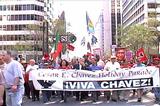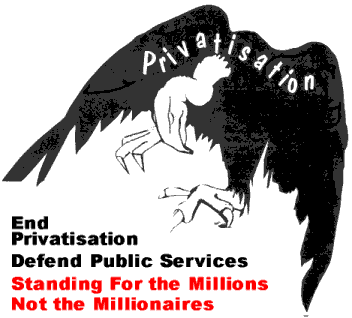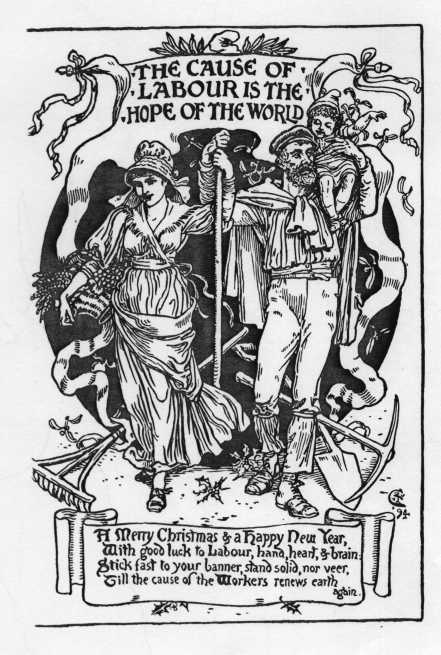| slaskrad |
2002/12/29
 Venezuela Black December, Sand in the Wheels (n°158), ATTAC Weekly newsletter - Wednesday 25/12/02 Venezuela Black December, Sand in the Wheels (n°158), ATTAC Weekly newsletter - Wednesday 25/12/02
The new coup against the government of Venezuela by the oil industry was to be foreseen by September of this year. This was the continuation of the failed coup d'état in April of this year. Therefore there was not any need of the snipers, which got involved on any opportunity, nor of the mass media controlled by the leading groups of the economic powers. ATTAC Venezuela; Solidarity Action, Sand in the Wheels (n°158), ATTAC Weekly newsletter - Wednesday 25/12/02 ATTAC Venezuela calls your attention to the role played by the Inter American Commission on Human Rights (IACHR) during this year regarding the situation in Venezuela. According to ATTAC Venezuela, the IACHR, has favored the interests of the wealthiest and reactionary sectors of the economy and media which are responsible for destabilizing democracy in Venezuela and the legal Government, elected in fair and legitimate elections. 2002/12/23
2002/12/20
Mark Weisbrot; U.S. Intervening Against Democracy in Venezuela, AlterNet 18.12.2002
For two weeks during this country's business-led strike, the privately owned stations that dominate Venezuelan television have been running opposition "infomercials" instead of advertisements, in addition to what is often non-stop coverage of opposition protests. "I am sure there is money from abroad," asserts Moncada. It's a good guess: Prior to the coup on April 11, the U.S. National Endowment for Democracy stepped up its funding to opposition groups, including money funneled through the International Republican Institute. The latter's funding multiplied more than sixfold, to $340,000 in 2001. But if history is any guide, overt funding from Washington will turn out to be the tip of the iceberg. This was the case in Haiti, Nicaragua, Chile and other countries where Washington has sought "regime change" because our leaders didn't agree with the voters' choice at the polls. (In fact, Washington is currently aiding efforts to oust President Aristide in Haiti - for the second time). In these episodes, which extended into the 1990s, our government concealed amounts up to the hundreds of millions of dollars that paid for such things as death squads, strikes, economic destabilization, electoral campaigns and media. 2002/12/19
Thanks to Magnus the Great Trainspotter for this link:
Stan Goff; Military Matters #1 - The Left and the Military: Leaping the Chasm, Freedom Road Socialist Organization 12.11.2002 The majority who remain in the military remain there for these reasons. It never occurs to them that what they like about the military is socialist. They frequently hate the deployments, the occasional violence, the bureaucratic backbiting, and the ubiquitous incompetence. They put up with all these negatives because they and their families enjoy some modicum of security and well-being. Soldiers know some of the concrete possibilities of socialism better than the rest of us. They've lived them. When we refuse to take up the issue of women or gays in the military —masking contradictions by saying we are "against" the military anyway—we are missing the point that this is an issue of gender equality in federal employment. Queer people are isolated altogether, and women are legally excluded from the majority of positions (not specialties, that is different), and from those career tracks within which advancement is the fastest. Little understood outside the military is the negrophobia of the Special Operations subset within the otherwise thoroughly integrated armed forces. Here too is a wedge, a teachable moment for Black soldiers when we might begin to organize. Every successful revolution requires either the neutralization or active participation of military people. It's time we factor that into our thinking. It's time we thought about organizing within the military. We need them, and they need us. The whole Military Matters index. 2002/12/18
An interesting report when regarding the enlargement of the European Union, also the FTAA/ALCA raises similar issues as the neo-liberal colonisation of the east european countries.
Zip Locking North America, The Council of Canadians 2002 To fully comprehend the current nature of our relationship with the United States, we need to go back to the 1930s and the post-war period. Our size, our small population, the powerful north-south tug of the growing colossus on our border, all demanded of our political leadership a "sharing" model of nation-building. The United States, with a radically different political culture, chose the route of competition and the marketplace. Recently, Canada has moved from a co-operative model to an emphasis on the global economy, much more in line with the U.S. approach. There are five areas in which this paradigm shift in public policy - the abandonment of the post-war consensus in favour of a free market approach - have profoundly changed Canada, and continue to change it.
Bill Vann; Venezuela: Is the CIA preparing another coup?, World Socialist Web Site 11 December 2002
With a“strike” organized by Venezuela’s employers now entering its second week, there is every indication that the South American country is being subjected to a classic destabilization campaign organized in collaboration with US intelligence. Having failed to topple Venezuelan President Hugo Chavez in a US-backed coup last April, Venezuela’s ruling circles, working in conjunction with Washington, are attempting to force him to resign or provoke a new military seizure of power. The threat that Washington will intervene directly in Venezuela—a strategic source of imported petroleum for the American market—cannot be ruled out. Earlier postings: [ 1 | 2 | 3 | 4 | 6 ]
Winters Negbenebor; Globalisation , Independent Media and Development in Africa, Nigeria Independent Media Center 17.12.2002
I think it would be wise for us to first look into the following words that will today dominate this entire presentation - globalization, development and independent media. It is not necessary go into a dictionary definition of what these words mean because we are all familiar with their literary meaning. What should interest us at this stage of global conflict is what they mean to our brothers in Africa, who have only recently been trying to understand what these words means to them. To have a better presentation for the purpose of this paper, I will be using Nigeria as a case study, but with some few references to other parts of Africa. Globalization to an average African is simply neo-colonialism-a system that completely took effect with no consultation with Africa people, a second kind of colonialism that completely neglects people's welfare and promotes corporate business and profit alone. Tahir Hashim; Globalisation and Nigerian workers , Nigeria Independent Media Center 08.12.2002 In developing countries, after the war, there was already colonial rule in almost all of them including Nigeria, so there was no freedom of whatever type including availability of employment. Salaried employment was only found in public service as there were no industries then to employ people. Privatisation lies crumble, Nigeria Independent Media Center 08.12.2002 It is not always that our members of parliament act in tandem with the people they represent. But this Parliament seems to be a unique one - one which is striving to be on the side of the people. This Parliament has demonstrated on a number of key issues to be sensitive to, and respectful of, the feelings of the Zambian people. Funmi Komolafe; Labour: Let's create wealth, not manage poverty, Nigeria Independent Media Center 08.12.2002 A couple of weeks ago, the office of the Vice- President organised a talk on poverty reduction strategy programme. The trade unions and the civil society participated actively. Organised labour speaking through the Nigeria Labour Congress (NLC), presented a paper on "Main Factors in Deterioration of Poverty Situation in Nigeria and Effective exist Strategies".
Pentagon to target allies with covert propaganda, The Independent 17.12.2002
Pentagon is considering a plan to establish covert propaganda operations in countries it considers its allies in order to improve America's image and discredit hostile factions. The plan, revealed yesterday by The New York Times, involves efforts to undermine the influence of mosques and religious schools, perhaps by establishing moderate Islamic schools with US funding. Other suggestions being considered include paying journalists to write stories favourable to the United States and hiring contractors without obvious ties to the Pentagon to organise rallies and demonstrations in support of US policies. Pentagon Debates Propaganda Push in Allied Nations, The New York Times 15.12.2002 The Defense Department is considering issuing a secret directive to the American military to conduct covert operations aimed at influencing public opinion and policy makers in friendly and neutral countries, senior Pentagon and administration officials say. Defense Secretary Donald H. Rumsfeld has not yet decided on the proposal, which has ignited a fierce battle throughout the Bush administration over whether the military should carry out secret propaganda missions in friendly nations like Germany, where many of the Sept. 11 hijackers congregated, or Pakistan, still considered a haven for Al Qaeda's militants. 2002/12/17
Scientists criticise academic boycott, The Guardian 17.12.2002
Four leading scientists have voiced their opposition to the academic boycott of Israel, saying it could only be justified in "extreme circumstances" and as part of wider international "diplomatic, economic, cultural and sporting sanctions". In a letter to the Guardian, published today, Oxford professors Colin Blakemore, Richard Dawkins, Denis Noble and Michael Yudkin, who have formed a study group to discuss when, if ever, an academic boycott might be a reasonable response to a country's actions, said while they opposed an academic boycott of Israel, "it is possible to imagine" circumstances so extreme that the principles against a boycott should be dropped. But the threshold for this would have to be "extremely high".
Sadruddin Aga Khan; Earth on the market, Le Monde diplomatique December 2002
Despite all the hype, the UN-sponsored world summit on sustainable development in South Africa in August could not introduce any real constraints because they would have meant re-examining globalisation. So could sustainable development just be a pretext for maintaining a growth that must be, by nature, destructive to the environment?
Ignacio Ramonet; A less free press, Le Monde diplomatique December 2002
The digital revolution and the arrival of the internet have been traumatic for the world's media (1). News and information are now attracting the attention of industrial giants better known for involvement in electricity, computing, arms manufacture, construction, telecommunications and water. Eager for power and easy profits, they are in a hurry to buy into the action. Massive empires have been built in a very short time. And in the process fundamental human values are being destroyed. 2002/12/16
Christmas is approaching, so here is some news in that occasion: Bishop attacks 'sentimental' Christmas portrayals, Ananova 16.12.2002
A Church of England bishop has delivered a provocative Christmas message by claiming the Three Wise Men were part of an assassination plot. The Bishop of Lichfield, the Rt Rev Keith Sutton also pours scorn on the "sentimental" and "false" images in nativity plays and Christmas cards. He criticises the portrayal of the shepherds, who were on "the fringes of society", as loveable characters, according to the Daily Telegraph. 2002/12/10
 Edward Herman; Answering The Cruise MIssile Left On Iraq, ZNet 09.12.2002 Edward Herman; Answering The Cruise MIssile Left On Iraq, ZNet 09.12.2002
It is pretty depressing to see how frequently liberals and some leftists have been unable to maintain a principled opposition to the U.S. policies toward Iraq, which, following more than a decade of "sanctions of mass destruction" are now rushing us toward a war of outright aggression. There is significant opposition, manifested in the growing and numerous protest marches and teach-ins, where people of quite varied political beliefs have expressed opposition to the prospective war. But this widespread and deepening dissent has had only a modest impact on the mass media, which are still serving mainly as conduits and press agents of the war party, and the liberals and "leftists" who make it there commonly accept premises of the war party and serve its interests, which is of course why they make it into the media. More from ZNet's Iraq Debates collection of articles. 2002/12/06
Do you know Osama bin Kissinger?!
Kissinger and bin Laden: Takes One To Know One, AlterNet 03.12.2002 President Bush believes Henry Kissinger is the best choice to head up an investigation into the adequacy of our defenses against al-Qaeda and Osama bin Laden. He may be right. As the schoolyard taunt goes, "It takes one to know one." There is a remarkable symmetry between the conduct of Kissinger and bin Laden. Both believe the ends justify the means. Both believe that innocent civilians are pawns on a global chessboard and sometimes must be sacrificed to a higher geopolitical cause. Exit Henry Kissinger, The New York Times 14.12.2002 Henry Kissinger's decision yesterday to step aside as chairman of the Sept. 11 investigative commission clears the way for a fresh start for this critically important endeavor. The nation needs an unflinching review of the government failures that preceded the terror attacks. The only way to conduct such an inquiry is if all the commission members are free of business interests that could influence their work. President Bush, who selects the chairman of the 10-member panel, must now find someone of unquestioned independence and boldness. 2002/12/05
 Fair pay for the fire service. Support the Firefighters! Fair pay for the fire service. Support the Firefighters!
Update:
Firefighters - Their Fight Is Our Fight, The Socialist Weekly Newspaper 22.11.2002 Firefighters have won widespread support in their struggle for higher pay. Workers understand that Tony Blair has taken on the firefighters to try and 'teach a lesson' to others in the public sector who are suffering low pay and privatisation. Blair wants public services on the cheap - where the fat cats profit and workers are kept on poverty pay. That's why he says he can't pay firefighters the wage that they deserve. And that's why the firefighters should be supported by all those who work in or use public services. Seumas Milne; Blair gives modernity a bad name, The Guardian 05.12.2002  The government needs to settle the fire strikes as much as the FBU. The government needs to settle the fire strikes as much as the FBU.
The trouble is that after five years in power, new Labour is in danger of giving modernity a bad name. What started as a catch-all mantra to justify the party's acceptance of the main social and economic changes driven through in the Tory years has now become a codeword in public services for privatisation, closures, job cuts, longer working hours and flexibility on the employer's terms. The only sense in which any of this is modern is that it apes the most backward-looking practices that have again become the norm in the private sector in the past two decades. 2002/12/04
Peter Beaumont; Why we are losing the war, The Observer 01.12.2002
When the dust has settled and the blood and tears have dried, we will be able to say one thing with certainty about last week's terrorist attack in Kenya. Anyone who tells you the war against terrorism is being won is lying. It is the great heresy of free societies, so speak it softly, but the accumulating evidence of the past four years is that terrorism can - and does - work. And it is working on a global scale. It is a simple fact that is more terrifying than any of attacks themselves - 11 September included. That a tiny group of extremists, for the most part using the most basic of technologies, could effect such a startling paradigm shift that has transformed the world we live in. But to what end? The answer is more surprising than our political classes appear yet to have grasped. |
